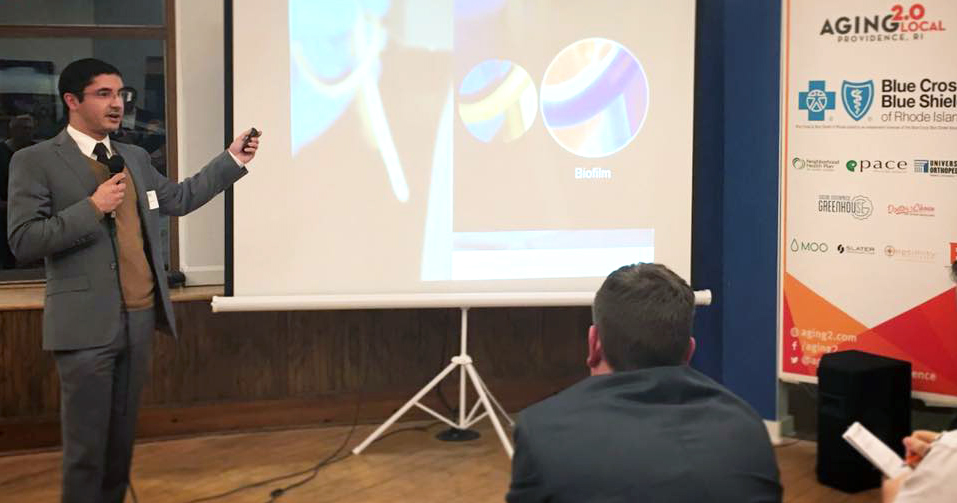November 21, 2017
When Francisco Portela first started working at Mass General as an oncology fellow, he was shocked at what he saw. “I got to this world-famous hospital… and people were dying of urinary tract infections.”
Francisco is referring to a specific phenomenon called Catheter-Associated Urinary Tract Infections, or CAUTIs. According to the CDC, between 15-25% of hospitalized patients receive urinary catheters during their hospital stay. In fact, 75% of all UTIs are catheter-associated UTIs, which makes up 560,000+ cases per year.
What’s even more grave is that the chance of infection compounds at 9% per day for each day the catheter is in place, and in extended use, patients are 3 times more likely to die because of the catheter ( www.portelsonimedical.com).
Francisco saw the problem firsthand. “It was kind of intuitive, you could see the biofilm growing on the [urinary] catheters, but the truth is because of its location, no one ever looks at it.” And even if someone does look at it, “there is no treatment paradigm for how you are supposed to be cleaning the catheter” to prevent infection. Francisco at first did what most curious people would do, he hit the library and questioned every nurse, resident and attending he could find. “I was printing hundreds of pages on the subject and talking with people and I realized there really wasn’t a solution yet”.
This is when he dedicated himself to learning independently. He did research and discovered that urinary catheter design has not changed much since 1935. While there was no existing protocol for preventing CAUTIs, Francisco found that a solution could be very simple. The human body is equipped to flush out bacteria through urination.The urinary catheter in its current form does not allow for this. If you can restore this flow, you can prevent infection. He formulated the idea for the catheter with his roommate at Purdue University, Amit Soni, his cofounder. “We would get homework done just so we could design and test what would work,” he said. After graduation, Francisco worked in nursing while continuing to develop the product. He officially launched Portela Soni Medical LLC in 2015.
Starting a medtech company takes serious guts. It represents a complex, tedious, and drawn-out process to bring a product or therapy to market––which is not for the faint of heart. By virtue of necessary research and development, this process is also very capital-intensive. As a result, fundraising represents a major component of a medtech entrepreneur’s job description. As Francisco puts it “I think we’ll always be fundraising.” Though it’s been a challenging experience, he’s learned that asking the right questions of prospective investors can save entrepreneurs plenty of time and money.
In 2016, Portela Soni Medical was accepted to SEG’s inaugural Health and Wellness Accelerator program. At this point, the organization was still building their team and had just begun the process of acquiring a patent. According to Francisco, the accelerator program bettered team cohesion and focus. Even today, Francisco still draws on the support from coaches he met through the accelerator. The program culminated in a graduation and pitch event where the company connected with an investor.
Fast forward one year since the program, and the company has a patent pending in United States, China and Europe. They have reduced their projected capital needs, completed their advisory board, brought on senior leadership, and best of all––have finished developing the product. “We’ve put all the dominos right in place and we’ve back-tracked to the kicker which is financing,” Francisco said.
Luckily, thanks to the hard work of Francisco and everyone at Portela Soni Medical, they’ll soon be closing their Series A round of funding in order to gain FDA clearance.
Portela Soni Medical’s end goal is nothing short of global adoption. Francisco predicts that early-stage growth will be fueled by additional capital, while global adoption will depend more on market adoption.
“Simply, the more we grow, the greater the access will be for hospitals, nursing homes, and rehabs to provide a better and safer technology for their patients.”
Cameron Keegan
Digital Marketing Intern
Cameron is a senior concentrating in Business, Entrepreneurship & Organizations at Brown University and splits his time between Providence, Seattle, and the San Francisco Bay Area. When not pursuing eclectic experiences in the nonprofit and for-profit sectors, he loves running, reading, exploring city vistas, and considers himself a newly-converted podcast junkie.


